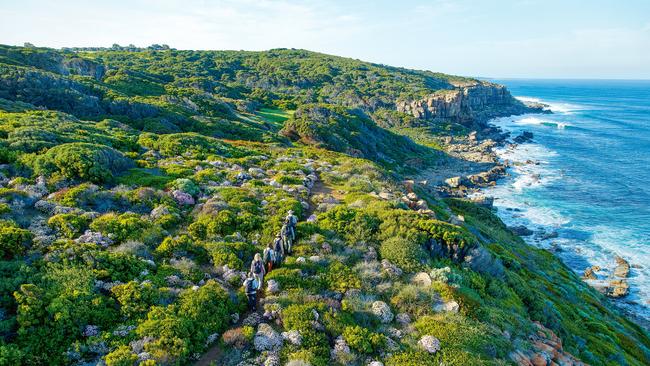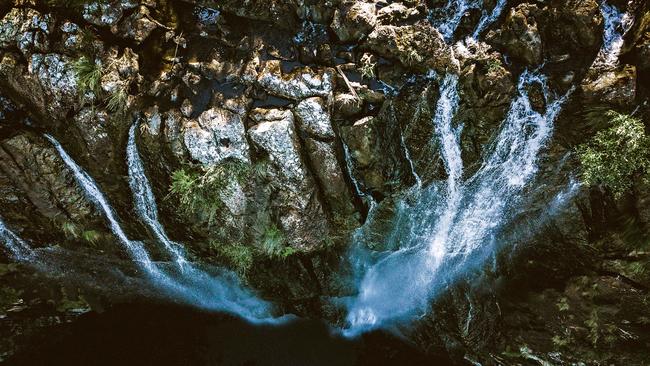Why walking in nature is good for mind, body and soul
The simple act of walking in nature is being hailed as a health booster for everyone from Gen Z to Boomers and beyond.

The air in a rainforest has a very distinct quality. It’s almost thick, with a clean, earthy aroma that no air-freshener company – despite repeated attempts and convincing marketing material – has ever come even close to replicating.
When my lungs – having been immersed in questionable aircraft-cabin gases all morning – breathe in the atmosphere of Currumbin Valley’s Cougal Cascades rainforest, I’m hit with a mild, pleasant buzz. I interpret it as a thanks from my weary body for the gift of richly oxygenated, fresh air.
1. Immunity benefits
The real reason for the pleasant high, it turns out, is probably due to the chemicals I’ve just microdosed. As our group pauses to appreciate the quiet babble of Currumbin Creek and vibrant green canopy above, forest therapy guide Monique Ross informs us we’re currently being drugged. By trees.
“Research from Japan has found humans can absorb phytoncides emitted from trees,” she says. At this, we all look up to the leafy foliage, hoping in vain to catch the wicked flora in the act.
The volatile compounds, she continues, are produced by plants to protect them from insects and fungi. These aromatic tree medicines can have a protective and beneficial effect on us, too, increasing the activity of our natural killer cells (which make up part of our immune system) and boosting levels of anti-cancer proteins.
2. Improves mood
It’s perhaps one reason why walking in nature has such a profound effect on us, and why the inability to experience the world’s wild places during the pandemic made so many of us yearn to recommune with our natural environment.
“We come from nature, and we’ve separated ourselves to fit into this, you know, modern world, but nature is where we’ve come from and where we belong,” says my walking companion Laura Waters. It’s 10 years since the author, now 54, walked the length of New Zealand’s North and South islands. The 3000-kilometre, five-month solo journey completely changed her life.
“I was working as an assistant to a chief executive for 10 years, and then I realised through the course of the hike that I didn’t want to go back to that old life,” she says.
A couple of weeks into the hike, which she planned to complete with a girlfriend who ended up pulling out two days in, Waters says her anxiety symptoms disappeared. “I experienced this sense of freedom, like the world was my oyster,” she says. “It gave me courage and resilience; it healed me.”

Her adventure is in stark contrast to the “trek” we embark on the following day; an easy 10-kilometre return trek through Goonengerry National Park. We look like serious hikers, with our waterproof Kathmandu backpacks and rain jackets, but when you consider our base camp is luxurious wellness retreat Soma Byron Bay, we’re definitely not roughing it. But that’s the beauty of nature walking. It’s the most egalitarian physical activity you can do, transcending age, wealth, fitness level and location. All you need is a pair of sturdy walking shoes, weather-appropriate clothing and a map.
And in what could be seen as a response to the increasingly complicated world of wellness, more of us are returning to the simple, time-honoured health practice. Data from Ausplay, which tracks national participation in sport and physical activity, shows the number of Australians who bushwalk at least once a month has almost doubled since 2017, up from 596,000 to 1.158 million.
3. Helps reduce stress
Last year AllTrails, a map and trail app for walkers and hikers, was awarded Apple’s App of the Year, reflecting the growing interest in exploring the outdoors. It now has 65 million users who regularly use the platform to plan and document their nature walks and share information. AllTrails chief medical advisor Dr Suzanne Hackenmiller says research shows nature walks offer added mental health benefits to walking in man-made environments. “A study from 2015 found that adults who took 90-minute walks in nature reported less ‘rumination’, or dwelling on negative, stressful thoughts, than those who walked in urban settings,” Hackenmiller tells WISH.
Walk Into Luxury’s Nikki King says her business’s growth has exploded in the wake of covid. The managing director of the 10-year-old travel company, which coordinates outdoor walking experiences and luxury accommodation, both in Australia and countries such as New Zealand and Patagonia, says the team is seeing huge demand “not just for walking holidays, but nature-based travel as a whole”.
“The pandemic had more of us feeling the need to escape from city crowds, reconnect with family and prioritise wellness,” King says.
Even the TikTok generation is on board. The humble activity has been Gen Z-ified, with the popular social media platform now flooded with selfies of twentysomethings documenting their daily “hot girl walks”. And in what may strike fear in the hearts of the ultra-connected, the concept of “silent walks” is also gaining traction, where walkers refrain from listening to music or podcasts.
4. Improves overall well-being
The good news is that for most of us, it’s never too late to start. Just ask Val Wake. When we speak, the 77-year-old Victorian has just returned from a three-day walk with the CAEX bushwalking club, of which she’s been a member for three decades. “My level of fitness wasn’t very good when I started, but within a few months, I found I could do a 20-kilometre walk,” she says. “It was tiring, but I could manage it.”
Wake says the social, mental and physical benefits of the walks for members, who range in age from the “young ones” in their fifties up to those in their mid-eighties, are profound. “You get out in the bush and there’s just something about walking through lovely, lovely environments with lots of trees and greenery,” she says.
I am reminded of my recent phytoncide encounter and can’t stop myself from remarking that “the feeling is almost like a natural high”.

This story is from the August issue of WISH.





To join the conversation, please log in. Don't have an account? Register
Join the conversation, you are commenting as Logout